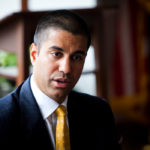The announcement could come as soon as this afternoon, the sources said. Pai, a Barack Obama nominee who has served as the senior FCC Republican for more than three years, could take the new role immediately and wouldn’t require approval by the Senate because he was already confirmed to serve at the agency.
A spokesman for Pai declined to comment and the Trump transition team did not immediately respond to an emailed request for comment.
Pai, who met with Trump in New York on Monday, had been seen by many as a top contender for the job given his reputation as a telecom law expert who’s comfortable in front of the camera. But his selection is also somewhat of a departure for the incoming administration, which has tapped people outside of Washington for many top positions.
By contrast, Pai is already a familiar name in tech and telecom policy debates. He’s a fierce and vocal critic of many regulations passed by the commission’s Democratic majority, including the 2015 net neutrality rules that require internet service providers to treat all web traffic equally and are opposed by the major broadband companies. As chairman, Pai will be able to start the process of undoing the net neutrality order and pursuing other deregulatory efforts.
Pai was widely assumed to be taking the agency’s gavel at least temporarily as an acting chairman at the beginning of Trump’s tenure. But Trump’s decision to make him a more permanent chairman affords the Kansas-bred Republican a bigger mandate to make his mark on the agency and its rules.
Pai and fellow GOP Commissioner Mike O’Rielly, for example, said last month that they will “seek to revisit” the net neutrality rules “as soon as possible,” and Pai said in a December speech he believes 2017 is the best opportunity in the last decade to advance conservative principles. In September, he outlined a “Digital Empowerment Agenda” — a four-point plan he says will help spur investment in internet networks and close the digital divide between rich and poor. The approach seeks to expand access to mobile broadband and reduce regulatory barriers to broadband deployment.
Pai, who turned 44 earlier this month, has spent much of his 18 years in Washington in public service with the DOJ, Senate Judiciary Committee and the FCC. He also worked for two years as a lawyer for Verizon, and spent another year representing telecommunications clients at Jenner & Block.
His FCC term technically expired last year, but agency rules allow him to continue serving through 2017. He would need to be reconfirmed by the Senate this year if he were to continue serving as chairman.

